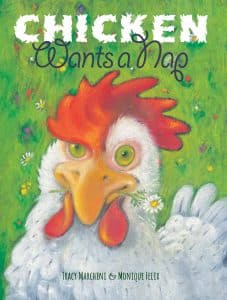For CHICKEN WANTS A NAP’s #PubDay, I’m sharing tips on how to think like an agent
- By: admin | Date: Aug 15 2017

 My debut picture book, Chicken Wants a Nap, is being released today!
My debut picture book, Chicken Wants a Nap, is being released today!
I’ve talked about the book’s path to publication on other blogs (you can find links on my Twitter or Facebook page), but I wanted to talk a bit about three ways my work as an agent influences my writing, and hopefully pass on some useful advice!
Market research
It’s certainly an advantage to be constantly reading and thinking about what’s selling, what’s not, what editors are looking for, and similarly – what I’m looking for as an agent.
As an author, I don’t write for the market, but I also don’t write in a vacuum.
What you can do as an author…
Follow the manuscript wish list requests (#mswl) of agents and editors, the deals being reported in Publisher’s Weekly, and the books that are being promoted (faced out or end-capped) in your local bookstores.
I’m not advocating that you write for the market – the market will shift and change, and more important – you’re going to have to spend a lot of time with this book. You want to write it because you’re excited by it.
But if you’re a picture book writer, you might have noticed that the picture book market has shifted to prefer shorter, sparser texts in commercial picture books. Or you might notice that the market is open to middle grades with heavier themes than one might have expected if they aren’t watching the shelves. When you’re looking at trends, pay attention to both content and form.
It’s also important not to look at any one agent or editor’s #mswl as gospel. I don’t represent YA horror, but that doesn’t mean it’s not marketable. In fact, I know at least one of my colleagues is specifically looking for YA horror. (It’s Moe!)
Editing
As an agent, I’m constantly editing manuscripts for my clients. But sometimes I realize while I’m editing a client work that one of my own manuscripts has the very same problem! So perhaps I note in a client’s editorial feedback that one character’s motivation is unclear, and then I make a note for my own project and start thinking about how to clarify my protagonist’s sense of logic as well.
What you can do as an author…
Make sure that you give as many thoughtful critiques as you receive. The better you are as a critique partner, the more you’ll be able to see those same issues in your own manuscript as well.
Be honest with yourself about your strengths and weaknesses as a writer, and actively work to fix those issues. For example, if you know pacing is a problem in most of your work, then read craft books on structure and pacing as you draft and revise.
Career planning
As an agent, I’m thinking about the best moves for my clients in terms of their long-term career. And while it can be difficult to see some of these things for yourself, when I think about what to write next I do think about how that might fit into my long-term goals. For example, I write for both children and teens, but right now I’m focusing on my picture book manuscripts because I’d like to continue to build that audience at this time.
What you can do as an author…
If you have an agent, then this is the perfect discussion to have with them. What do they see as your next best step? And if you want to change genres, how do they recommend you do that?
If you don’t have an agent, then perhaps that is your next best long-term career move. And if you’re looking and haven’t been successful, then besides the market research above, then maybe it’s time to do some brainstorming with yourself or a trusted, experienced fellow author.
Grab a piece of paper and ask yourself “What do I need to do to make my writing more attractive to an agent or editor?” and jot down everything that comes to mind. Maybe there’s a craft issue that you subconsciously know is a problem but that you haven’t been quite ready to face. Maybe you’ve been receiving the same feedback in rejections and it’s time to take another look at that project. Sometimes, we know what we have to do, and we just need that extra push to do it.
So make that list. Whether the question is “What do I need to do to make my writing more attractive to an agent?” or “What do I have to do to be happy with my web presence?” or “What do I have to do to take my work-in-progress to the next level?” I’ll bet you come up with some pretty great next steps.
 Literary Agent Tracy Marchini is proud to represent fiction, non-fiction and illustration for children and teens from both debut and award-winning authors and illustrators. Prior to joining BookEnds, she earned her MFA in Writing for Children, ran her own freelance editorial business, and worked as a Literary Agents Assistant for several years.
Literary Agent Tracy Marchini is proud to represent fiction, non-fiction and illustration for children and teens from both debut and award-winning authors and illustrators. Prior to joining BookEnds, she earned her MFA in Writing for Children, ran her own freelance editorial business, and worked as a Literary Agents Assistant for several years.
Kirkus Reviews gave her debut picture book, Chicken Wants a Nap, a starred review, calling it “a surprising gem.”

Great advice. Best of Luck with your great looking new PB!
Thank you Louann!
Tracy, I hope you’re right >>The better you are as a critique partner, the more you’ll be able to see those same issues in your own manuscript as well.<<
I both judge in contests and critique work regularly and often get feedback that I spot things others don't see… but I still can't see it in my own work. Argh. Drives me bonkers, lol. Maybe it will twig one of these days.
I’ll bet you see more than you think – especially if others notice that you have an eagle eye!
Great post – I love seeing how you allow synergy to build between the various aspects of your career. It’s something I actively try to do between my day job and my fiction, and usually people act like I’m crazy when I mention it.
I confess to being slightly disappointed you didn’t actually talk about naps, or chickens. I started napping a few weeks ago, and am on a crusade to spread the nap love. On the other hand, your book looks like the kind of thing my younger kids would find hysterical. So something for the TBR pile.
Oh – the number of words I could use on naps would be boundless, and certainly too many for the average blog post.
As for chickens, I’ll admit that our Literary Assistant James McGowan can tell you even more than I! (If we’re talking ducks though…)